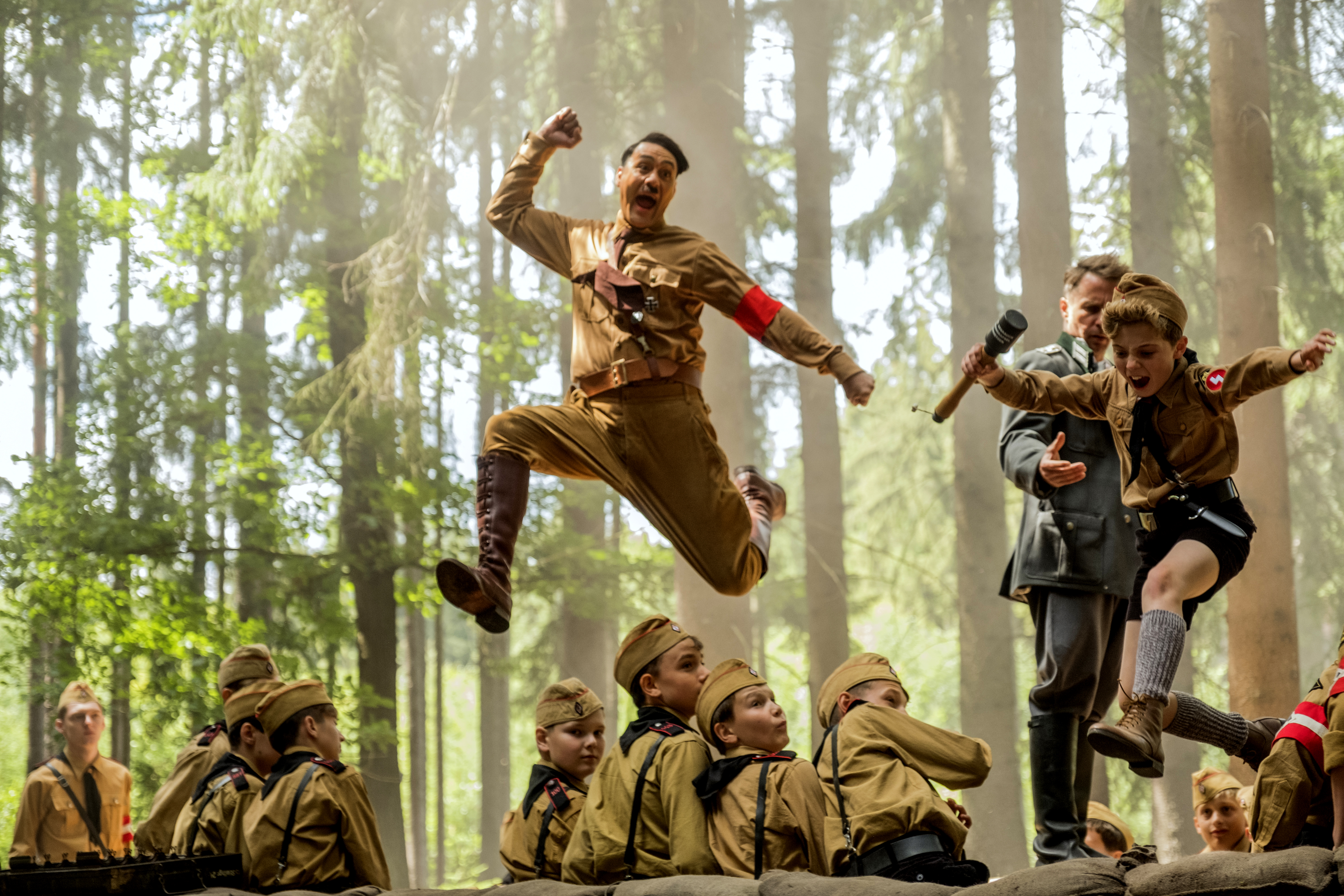So many Hitlers: On the biggest trends from the 2019 Toronto International Film Festival
There was a lot to like at this year's TIFF. There was also a lot of Hitler.


A free daily email with the biggest news stories of the day – and the best features from TheWeek.com
You are now subscribed
Your newsletter sign-up was successful
One of the defining moments of the 2019 Toronto International Film Festival happened thousands of miles away, in Italy. On Saturday — day three of the fest — the news broke that that the grim-'n'-gritty comic book thriller Joker had won the top prize at the Venice Film Festival. Joker hadn't screened in Toronto yet, but fest-goers were already abuzz. Did a movie about a Batman super-villain really just win one of international cinema's biggest awards? Could it become an Oscar contender? Had the movie world gone as mad as the real world?
Joker proved just as divisive after its TIFF premiere. Joaquin Phoenix's nervy performance as a mentally ill comedian is undeniably remarkable, but many critics (myself included) found the movie tedious until its final 20 minutes, when the title character drags a whole city into his psychosis. Only at the end does Joker's warmed-over hash of Taxi Driver and Fight Club come to a point, having to do with the media's at-times dangerous attraction to unhinged oddballs.
Still, while Joker will undoubtedly find some fervent fans, the film felt out of place at his year's TIFF. In 2019, the best Toronto movies did indeed grapple with serious subjects: like fascism, corruption, divorce, income inequality, and the end-times. But they did so with more creativity, wit, and showmanship than Joker.
The Week
Escape your echo chamber. Get the facts behind the news, plus analysis from multiple perspectives.

Sign up for The Week's Free Newsletters
From our morning news briefing to a weekly Good News Newsletter, get the best of The Week delivered directly to your inbox.
From our morning news briefing to a weekly Good News Newsletter, get the best of The Week delivered directly to your inbox.
Here's just some of what film buffs can look forward to in the months ahead, as the multiplexes fill up with award-worthy movies trying to reflect our reality — and in some cases trying to shape it.
Hi, Hitler!
Last year, Toronto audiences gave the race-relations dramedy Green Book the festival's "People's Choice Award" — an upset over Alfonso Cuarón's semi-autobiographical masterpiece Roma, in what turned out to be a preview of the 2018-19 Oscar race. This year, the people picked Jojo Rabbit, a whimsical World War II comedy, about a German boy whose loyalties are divided between his imaginary friend Adolf Hitler (played by the movie's writer-director Taika Waititi) and the Jewish teenager his mother is hiding in the attic.
Jojo Rabbit may be too cutesy and eccentric to win any Oscars. But it's a fun film, with a meaningful reminder that turbulent times eventually pass. The movie argues that even the smallest gestures of human kindness and compassion matter, when the social order collapses.
A free daily email with the biggest news stories of the day – and the best features from TheWeek.com
That's also the theme of the more somber A Hidden Life, director Terrence Malick's visually lush, three-hour examination of the life of Franz Jägerstätter (August Diehl), an Austrian imprisoned and tortured by the Nazis in 1943 because he refused to swear loyalty to Hitler. A Hidden Life is intense, bordering on grueling at times. But it's also frequently transcendent, as it explores the spiritual dimension of resisting immoral leaders.
There's a Hitler cameo in About Endlessness, Swedish filmmaker Roy Andersson's latest exercise in elaborately choreographed, stubbornly deadpan absurdism. The movie consists of a series of sketches about everyday calamities and despair. At one point, Andersson depicts Hitler's final hours on Earth, in a scene no more or less significant than a later shot of some random schmo's broken-down car. Andersson's larger point is similar to Malick's and Waiti's: No matter what, the world keeps turning, revolving daily through darkness and light.
The most clever use of Nazis at this year's TIFF though came courtesy of writer-director Rian Johnson, whose lively murder mystery Knives Out sprinkles "alt-right" activists into its story of an obscenely wealthy family. Slyly political, the movie pits the blue-bloods against one of their employees (well-played by Ana de Armas), who may know more than she pretends about their patriarch's death.
Johnson is paying homage here to the classic 1970s and '80s movie and TV mysteries, many of which were similarly concerned with the arrogance of the rich. Knives Out dazzles with the intricacy of its storytelling, the delightful hamminess of its performances (from the likes of Daniel Craig, Chris Evans, Jamie Lee Curtis, Toni Collette, Michael Shannon, and Don Johnson), and its optimism that simple human decency can prevail over self-serving greed.
The plots thicken ...
Knives Out exemplified a welcome trend at this year's TIFF: Riotously entertaining movies with impressively tricky plotting. The international cops-and-crooks thriller The Whistlers (about narcotics agents so deeply undercover that nothing they say can be taken at face value), the art-word Euro-noir The Burnt Orange Heresy (about a desperate critic trying to charm a famously reclusive painter) and the low-budget alien-invasion saga The Vast of Night (about two early '60s New Mexico teenagers investigating paranormal phenomena) are all stylish, well-acted, and masterfully told stories, first and foremost. They're a pleasure to watch, and admirable for their craft.
Some of these stories serve a larger purpose. The jaunty true-crime picture Bad Education stars Hugh Jackman and Allison Janney as Long Island public school administrators, caught up in an embezzlement scandal. Director Cory Finley and screenwriter Mike Makowsky spring surprises throughout the film, toying with the audience's sympathy. But anyone paying close attention to Bad Education should pick up on its deeply embedded critique of how inadequately compensated public servants are for the value they add to communities.
There are no such lessons in the white-knuckle suspense movie Uncut Gems ... but that doesn't make the movie any less magnificent. Adam Sandler (in a career-best performance) plays a gambling-addicted New York diamond dealer, who over the course of several days is juggling multiple make-or-break deals and a series of crazy high-roller bets. The writer-director team of Josh and Benny Safdie plunge viewers into the bedlam of their anti-hero's life, as it careens out of control.
Like the best plot-driven pictures, Uncut Gems is an experience, leaving viewers giddy and exhausted at the end — and perhaps happy that their own lives are comparatively saner.
Waiting for the end of the world
Almost as harrowing as Uncut Gems, writer-director Noah Baumbach's riveting Marriage Story (the first runner-up for this year's People's Choice Award) stars Adam Driver and Scarlett Johansson as New York theater-folk going through a divorce. Though it features Baumbach's usual sharp dialogue and keen observations, Marriage Story also has the urgency of a courtroom thriller, as the two exes — given equally sympathetic treatment by Baumbach — find themselves in competing "must-win" scenarios, regretting how the legal system forces them to confront their failures.
The death of the marriage in Marriage Story doesn't represent anything more than itself. Yet there's an underlying relevance here too, as these two characters endure one of the worst experiences of their lives, and somehow make it through. The movie is heartbreaking, but not pessimistic.
Overall, there were fewer howls of despair in Toronto this year, and a lot more, "Okay, now what?" In the monster movie Sea Fever, a fishing boat gets snared by a beast with poison-oozing tentacles, and the conversation among the crew slowly turns from "How can we kill this thing?" to "How far are we willing to go to survive?" In the animated Japanese fantasy-romance Weathering with You, two kids struggle to bring sunshine to a perpetually rainy near-future Tokyo, but soon wonder if their time might be better spent learning to live in a flooded city.
Over and over at this year's TIFF, filmmakers asked the same question: How should we react to impossible situations? Should we be like the late children's show host Fred Rogers — played gracefully by Tom Hanks in the tear-jerking slice-of-life A Beautiful Day in the Neighborhood — and urge people to love and appreciate each other? Should we be like the late comedian Rudy Ray Moore — played with infectious gusto by Eddie Murphy in Dolemite Is My Name — and create our own opportunities to succeed?
Or should we be like the family in Bong Joon-ho's wonderfully wicked Parasite, and just grab whatever we can? The winner of this year's Palme D'Or at Cannes — and the second runner-up for TIFF's People's Choice Award — Parasite is like a much more artful, enjoyable version of Joker. Both films are about class divisions, and an uprising of the downtrodden. But in Bong's story, the heroes are a lovably scruffy clan of grifters, who work their way into the lives of a rich family and exploit them ... until a startling mid-movie twist derails their schemes.
Smart, funny, exciting, and hooky, Parasite shared the strengths of the other great films that played Toronto this year. Our best filmmakers aren't ignoring the many ways our world seems to be sliding into chaos. They're yanking their audiences right into the mayhem, and helping us enjoy the ride.
Want more essential commentary and analysis like this delivered straight to your inbox? Sign up for The Week's "Today's best articles" newsletter here.
Noel Murray is a freelance writer, living in Arkansas with his wife and two kids. He was one of the co-founders of the late, lamented movie/culture website The Dissolve, and his articles about film, TV, music, and comics currently appear regularly in The A.V. Club, Rolling Stone, Vulture, The Los Angeles Times, and The New York Times.
